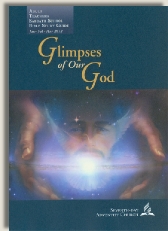|
||||||||||||||
Commentary on "God the Lawgiver"
Day 3: Monday, February 6, 2012 - The Law Before Sinai
The writer here again wants build the case that the law existed from creation (assumption) and build a bridge for us to cross and embrace the idea that the Ten Commandments are a transcript of God’s character. This is not biblical.
Deuteronomy 5:3 says, "The LORD did not make this covenant with our fathers, but with us, with all those of us alive here today.”
Also, in Galatians 3:17 states that the law was given 430 years after Abraham.
For whatever reason, it is easier for Adventist theology to support the idea that the 10 commandments existed before Sinai, than to accept the notion that sin is not narrowly defined by law-breaking.
The Bible states that when we were born, by nature, we were children of wrath (Ephesians 2). Because of Adam’s disobedience to the very word of God, we were born in sin. That is what makes us guilty before a Holy God, not the fact that we break a law given to Israel. The solution to our sin problem is the rebirth (John 3) not better, more conscientious law-keeping.
The author uses Genesis 9:6 (God denounces murder) as support for the 10 commandment principles being known before Sinai. The fact that people know right from wrong (adultery, murder, stealing), and those rights and wrongs are included in the 10 commandments does not prove that the law pre-dates Sinai now that the 10 commandment law is binding on all humanity. If principles for godly living are what the author is after, then a simple review of Romans 8:1-17, Galatians, 5:13-26 and Ephesians 4:17-32 will explain what it looks like to be governed by the Spirit (outside of the law).
Right and wrong is so much broader than the 10 commandments (as Jesus expressed in the Sermon on the Mount - Matthew 5). The only way to please a Holy God is to, by faith, accept His Son’s subtitutionary death and righteousness. We live godly lives because of the power and leading of the Holy Spirit, not because of our intimate knowledge of the law.
The texts in Job are used as proof that the concepts of sin and righteousness existed pre-Sinai. Of course they did. I’ve never heard anyone argue that these concepts originated at Sinai. The fact is, sin should not be narrowly defined as law-breaking and there is righteousness apart from the law. (Romans 1:17, Romans 4).
The belief that without the law there is lawlessness and no standard of right and wrong is essential for Adventist belief to exist. They sincerely believe that a person’s character cannot develop unless they keep their eyes fixed on the 10 commandments (the transcript of God’s character, as they believe). But by keeping the focus on the law, they miss the centrality of Christ and the promised Holy Spirit.
The day ends citing Genesis 26:5 ends with an explanation about why Abraham must have been obeying the 10 commandments. “Certainly among all these were the Ten Commandments.” Once again, another weakly-supported assumption that the authors will attempt to build on. Incidentally, the whole story of Abraham highlights his faith, and how he was declared righteous because of his faith, not because of obedience to the command to circumcise (or any other law or command, for that matter).
But by keeping the focus on the law, Adventist theology maintains its focus on the importance of upholding the Sabbath commandment (notice, there is no indication in the Bible, that the Spirit leads you to keeping the Sabbath). This is exactly where Tuesday’s lesson is headed.
Question to consider: If the law was known since creation, then why does the author try to make the case, in Sunday’s lesson, that the people were trembling “as God’s great rule of right was presented before them” at Sinai?
Why is it important to emphasize something that is, at best, very vaguely hinted at (the pre-Sinai existence of the 10 commandments)? Would it be more prudent to build one’s beliefs on what you know from Scripture (the law was given 430 years after Abraham, the Covenant was not made with Israel’s ancestors, etc.) than to build your theology on assumptions?
Could one equally make the case that the whole law was given at creation, since Cain, Abel, Noah and Abraham also built altars and made sacrifices (instructions for altar building and sacrifices for offerings and sin were given in the law)? If so, what would this prove? Would it mean that we, Gentile Christians, are bound to the whole law which is a transcript of God’s character?
Copyright 2012 BibleStudiesForAdventists.com. All rights reserved. Revised February 4, 2012. This website is published by Life Assurance Ministries, Glendale, Arizona, USA, the publisher of Proclamation! Magazine. Contact email: BibleStudiesForAdventists@gmail.com.
The Sabbath School Bible Study Guide and the corresponding E.G. White Notes are published by Pacific Press Publishing Association, which is owned and operated by the Seventh-day Adventist church. The current quarter's editions are pictured above.
Official Adventist Resources
Standard Edition Study Guide Week 6
Teacher's Edition Study Guide Week 6
Easy Reading Edition Study Guide Wk 6
Search the Complete Published Ellen G. White Writings
Please Support This Project


